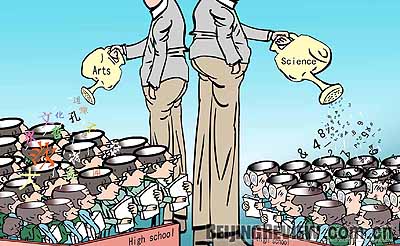|

China's practice of separating science and arts education has a long and complicated history. Back in the early 1950s, China decided to adopt the Soviet Union's practice of separating science and arts education into two systems, the upshot of which was many universities finding themselves divided into several specialized colleges and institutes. Senior high schools followed suit. In most schools, students are separated into science classes or arts classes in the second year of senior high school. Those in science classes do not study history or geography, while those in arts classes give up physics and chemistry.
At the end of 2008, Zhu Yongxin, a lawmaker at the National People's Congress who is also a professor at the Suzhou University, criticized the separation of science and arts education of having resulted in poorly-educated students and the subsequent drop in the national quality of students.
Many people echo Zhu's accusation. They believe that modern society demands multi-skilled people who are able to adapt quickly to the ever-evolving working environment. To this end, these people need a good understanding of both arts and science, something the separated education system is restricting.
Some people insist that it's ok to train students in either science or arts. They say it's unnecessary to teach subjects that will never be used after graduation. The modern world is undergoing rapid change, it's important to make clear what kind of knowledge is necessary and most helpful to students' development and progress.
Moreover, some others say that the separation of science and arts education will help to relieve senior high school students of heavy workload. This group explains that the current system fits China's higher education model and for the time being ensures the efficiency of the college admission process.
One education, two systems
Zhang Ruoyu (Xiaoxiang Morning News): During the senior high school period, students are forced to make a choice between science and arts, although some of them do not know which one they are more interested in.
Under the separated system, students can only receive either/or in a closed environment. Once it is knowledge outside their area of discipline, students become uneasy and even ignorant.
Is China still able to produce versatile scholars? We do not know. What we do know is with a system that tears education into different segments, this is becoming increasingly unlikely to happen.
Yan Nong (Yanzhao Metropolis Daily): Whether the separation of science and arts education should be cancelled depends on social demand. In the middle of the 20th century, the overall situation demanded the education system produce skilled people quickly, so as to satisfy the large demand for college students. At that time, the separation of science and arts education made this possible.
Today, China's education means to make people into citizens that suit modern society and possess both independent thought and liberal ideas.
Nowadays, education no long means to train technicians, but it means to improve individuals' personality and even the national competitiveness. The separated system is sheltering students' academic shortcomings and thus this model is becoming increasingly outdated. Worldwide it is only China that is separating its high school education into arts and science systems. It's high time we review this model.
Shan Shibing (Beijing Youth Daily): To separate science and arts disciplines into two systems is to treat knowledge as a tool for earning a living. Students of science disciplines are more popular with employers. As a result, more senior high school students tend to choose science disciplines and they begin to neglect arts subjects long before they finally make the choice.
Science disciplines tell students how to cope with things, while arts disciplines tell people how to develop a good personality. If arts education is neglected too much, it will undermine the building of students' personality.
China has already paid the price for its segmented education system, which hampers the development of both the cultural preferences and scientific creativity.
Lao Kaisheng (Beijing Morning Post): The separation of science and arts education is a training model that came into being in the planned economy days. Today, it is increasingly hampering the academic development. Nowadays, many new subjects emerge at the intersection point of academic subjects, and this demands people engaged in relevant work not be limited in a certain area.
The education model of separation of science and arts pays too much attention to the social demand but neglects individuals' overall development. With the transformation of the social economic system, the market rule will also work in the area of education. Since students have to share some education costs, they should be given the final say in choosing subjects of studies that they think will best show their strengths. This requires restrictions arising from the separation of science and arts education to be completely scrapped.
Exam-oriented education at fault
Jian Chao (guancha.gmw.cn): A strong ability in both science and arts is helpful for the long-term development of individuals and the society as a whole. However, developing the cultural taste and a scientific way of thinking is largely attributed to elementary education, more so than the separated education system in senior high school.
Education serves social demand. When judging the current education system, such as the separation of arts and science in senior high school, we have to ask if it is going against this demand. If so, then real change is necessary; if not, we have to say, no education is perfect, so we have to tolerate the current system.
| 